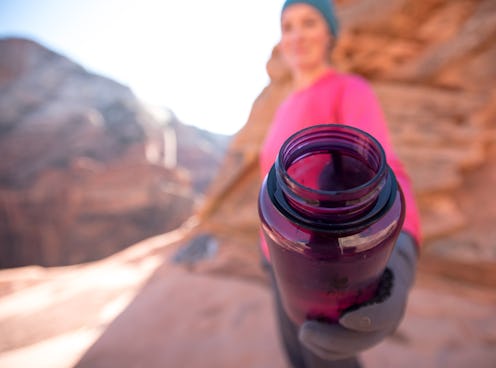Life
How Often You Actually Need To Clean Your Reusable Water Bottle

It's already been established that using a reusable water bottle is good for the planet because of the plastic you save. And you've probably figured out that it's good for your pockets, because you're not spending money on bottled drinks all the time. But if you don't clean your reusable water bottle often enough, it might not be great for your health. For those of you who haven't washed your bottle in a while, you might want to get on that ASAP.
According to microbiologist & senior research officer of Murdoch Children’s Research Institute, Dr. Celeste Donato, PhD, you should be cleaning your water bottle regularly after every use. Now, I know what you're thinking: but it's just water. While this may be true, it's not the water in your water bottle that's the issue, it's the fact that you put your mouth to it several times a day to drink.
"Your mouth can contain viruses and bacteria that can enter your water bottle as you drink and backwash from your mouth goes back into the bottle or from saliva around the rim," Dr. Donato tells Bustle. "Most of our bacteria and viruses won’t make you sick but they can under some circumstances." She also warns that you are likely to get sick or spread bacteria if you share your water bottle with others and don't wash it.
Even if you're a real expert at brushing your teeth, your mouth and saliva contain bacteria that stays behind when you finish taking a swig. To be specific, there are more than 700 different strains of bacteria that live in your mouth, according to the Journal of Microbiology. There's also a lot of bacteria that spreads from just touching your water bottle, Dr. Donato says.
"You touch many different surfaces throughout the day, some of which might be pretty gross such as hand rails on public transport and doorhandles in public toilets, picking up bacteria and viruses on your hands," Dr. Donato says. "These germs can be transferred to your water bottle and ingested, especially if you are touching the pull top on your bottle that you will then drink from directly." And all day, every day, until you properly wash your water bottle, the bacteria on it lingers and grows the more you use it. Grossed out yet?
It's also important to remember all of the places you take your water bottle, like the gym. This means your bottle is exposed to all the bacteria in the air as you and other people sweat. A 2018 study conducted in Brazil and published in the Journal of Exercise Physiology looked at exactly this using 30 shaker bottles given to gym-goers. After examining the subjects' water bottles after their gym session, the study found 25 of the water bottles showed bacteria growth, including E. Coli.
But don't worry. If you've never been one to wash your bottle, and don't know how exactly to clean your reusable water bottle, you can always learn. It's easy to do, but you're going to have to do more than just rinse it out with water. One way to clean your reusable water bottle is by emptying it out at the end of day, pouring in warm water, adding in a few drops of dish soap, and shaking it around. After you do this, rinse your bottle out a few times and it'll be good to go (just remember to carefully clean the lid too). You can also clean your water bottle using either vinegar or bicarbonate soda. And if you're too lazy to do either of these, you always have the option to just pop it in the dishwasher at the end of the night.
It doesn't matter what method of cleaning you use, so long as you use one. This way, you'll be able to take your next sip (and every sip after that) worry-free.
Studies Referenced:
Aas, J. A., Paster, B. J., Stokes, L. N., Olsen, I., & Dewhirst, F. E. (2005). Defining the normal bacterial flora of the oral cavity. Journal of clinical microbiology, 43(11), 5721–5732. https://www.ncbi.nlm.nih.gov/pmc/articles/PMC1287824/?_ga=2.46392933.33677911.1571868785-337637312.1571868785
Silveira, Matheus & Scudese, Estevão & Senna, Gilmar & Ferreira, Ana & Dantas, Estélio & Ribeiro, Luiz & Alvares, Alessandra & Garcia, Patrícia. (2018). Microbial Contamination in Shaker Bottles among Members of Fitness Centers. Journal of Exercise Physiology Online. 21. 134-142. https://www.asep.org/asep/asep/JEPonlineAUGUST2018_Senna.pdf
Experts:
Dr. Celeste Donato, PhD, microbiologist & senior research officer of Murdoch Children’s Research Institute
This article was originally published on